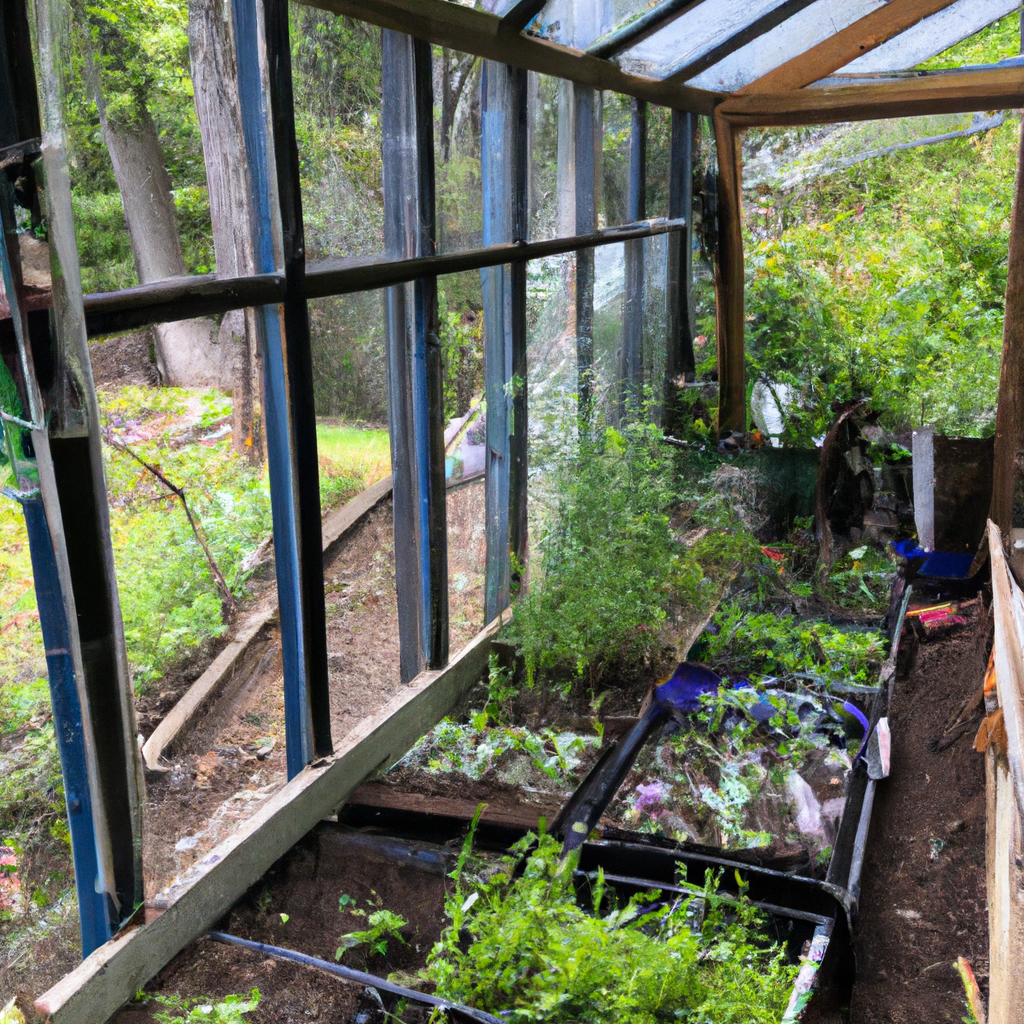Greenhouse gardening has become increasingly popular in recent years, allowing gardeners to extend the growing season and grow crops year-round. However, not all greenhouse gardening is created equal. There is a difference between organic greenhouse gardening and regular greenhouse gardening. While both methods may produce excellent results, understanding the distinction between the two can help you decide the type of gardening you want to pursue.
I. Introduction
Organic greenhouse gardening has become increasingly popular, but how does it differ from regular greenhouse gardening?
Organic greenhouse gardening and regular greenhouse gardening have differences that set them apart. Organic greenhouse gardening involves growing plants naturally without chemical pesticides or fertilizers. It relies on compost and natural remedies for pest control to improve soil health. Organic greenhouse gardening produces healthier produce free from any harmful chemicals. It is also more sustainable since it reduces the need for synthetic fertilizers and pesticides.
On the other hand, regular greenhouse gardening utilizes synthetic fertilizers and pesticides. Its focus is to boost plant growth and yield rather than soil health and natural pest control methods. Choosing between the two depends on values and priorities, but organic greenhouse gardening, although more challenging, is a healthier and more sustainable option.
II. What is organic greenhouse gardening?
Organic greenhouse gardening involves growing plants without chemical pesticides or fertilizers and relying on natural remedies for pest control.
Organic greenhouse gardening focuses on natural and sustainable practices that promote healthier plants. Unlike traditional greenhouse gardening, organic gardening avoids chemical pesticides and fertilizers. Instead, natural remedies, such as insect-repelling plants and beneficial insects, control pests. Compost, made from organic matter, is also used to enrich the soil and promote plant growth. By avoiding synthetic fertilizers and pesticides, organic greenhouse gardening produces healthier and more nutrient-rich produce and reduces the risk of harmful chemicals contaminating the environment.
Organic matter, such as compost, is used to improve soil health.
Organic matter, such as compost, is a key component of organic greenhouse gardening. Composting is a natural process that turns kitchen scraps, yard waste, and other organic matter into a nutrient-rich fertilizer. When added to the soil, compost improves soil health by providing essential nutrients and helping to retain moisture. Compost also enhances soil structure, creating a better environment for plants to thrive. Using compost in your greenhouse eliminates the need for synthetic fertilizers and helps you grow healthier, more sustainable plants. Composting is a great way to reduce household waste and do your part for the environment. [1][2]
III. Benefits of organic greenhouse gardening
Organic produce is healthier and free from potentially harmful chemicals.
Organic produce is widely considered healthier because it is free from potentially harmful chemicals found in conventionally grown fruits and vegetables. Pesticides and synthetic fertilizers are not used in organic farming, meaning the produce is not exposed to chemicals that can linger as residue. Organic produce is often said to contain more nutrients and antioxidants, which can benefit overall health. Additionally, consuming organic produce means supporting sustainable and environmentally friendly agricultural practices. [3][4]
Organic greenhouse gardening can be more sustainable, reducing the need for synthetic fertilizers and pesticides.
Organic greenhouse gardening promotes sustainability by reducing the need for synthetic fertilizers and pesticides. Chemical fertilizers and pesticides not only harm the environment but they also affect human health. Overusing these synthetic compounds decreases soil fertility, also leading to increased pests and diseases that become resistant to chemicals. In contrast, organic greenhouse gardening focuses on building soil health and natural pest control methods. This promotes a more balanced ecosystem, leading to longer-term sustainability. By avoiding harmful chemicals, organic greenhouse gardening is a healthier and safer option for both the environment and people.
IV. What is regular greenhouse gardening?
Regular greenhouse gardening uses synthetic fertilizers and pesticides to boost plant growth and protect against pests and diseases.
Regular greenhouse gardening is a common practice where synthetic fertilizers and pesticides enhance plant growth and protect them from diseases and pests. In this type of gardening, chemical fertilizers are used for quick nutrient absorption, and pesticides are used to keep the plants healthy and free from infestation. Though these chemical agents can lead to increased yield, they may leave residues on the produce. Unlike organic greenhouse gardening, regular greenhouse gardening mostly neglects soil health and focuses only on plant growth and yield.
V. Differences between organic and regular greenhouse gardening
The main difference is the use of chemicals: organic greenhouse gardening avoids them, while regular greenhouse gardening relies on them.
The main difference between organic and regular greenhouse gardening is the use of chemicals. In organic greenhouse gardening, synthetic pesticides or fertilizers are not used. Instead, natural remedies are relied upon for pest control, and organic matter like compost is used to improve soil health. On the other hand, regular greenhouse gardening relies on synthetic fertilizers and pesticides to boost plant growth and protect against pests and diseases. While this approach may be more convenient, it can harm the environment and human health. Choosing between the two depends on one's values and priorities, but it is essential to remember that organic greenhouse gardening is more sustainable and healthier.
Organic greenhouse gardening focuses on soil health and natural pest control methods, while regular greenhouse gardening focuses on boosting plant growth and yield.
Organic greenhouse gardening prioritizes soil health and natural pest control methods. This means compost and other organic matter are used to improve soil quality rather than rely on synthetic fertilizers. Natural remedies such as companion planting and insect predators also control pests rather than chemical pesticides. The focus is on creating a healthy, sustainable environment for the plants. In contrast, regular greenhouse gardening boosts plant growth and yield through synthetic fertilizers and pesticides. The goal is to produce as much produce as possible, often at the expense of the soil and environment.
VI. How to get certified for organic greenhouse gardening
To become certified for organic greenhouse gardening, you must meet strict organic standards the USDA sets.
If you want to become certified for organic greenhouse gardening, it is essential to know that there are strict organic standards set by the USDA that you must meet. These standards cover everything from seed selection to pest management and soil health. A certifying agency will inspect your greenhouse and ensure you follow all the necessary rules. Some requirements for organic certification include using only organic seeds and planting materials, avoiding genetically modified organisms (GMOs), and using only organic fertilizers and pest control methods. By meeting these standards, you can ensure that your organic greenhouse gardening practices are sustainable and healthy.
A certifying agency will inspect your greenhouse and ensure you follow all the necessary rules.
If you're interested in becoming certified for organic greenhouse gardening, you'll need to undergo a rigorous certification process. This involves meeting the USDA's strict organic standards and having a certifying agency inspect your greenhouse to ensure you're following all the necessary rules. This includes using organic or untreated seed if organic seed is unavailable, using approved materials for growing media, fertilizer, pest, and disease management, and not contaminating your crops with non-organic plants or materials. With proper certification, you can ensure your organic greenhouse gardening practices are sustainable and healthy. [5][6]
VII. Conclusion
Choosing between organic and regular greenhouse gardening depends on your values and priorities.
Choosing organic and regular greenhouse gardening depends on your values and priorities. If you prioritize sustainability and want to reduce the use of synthesizers and pesticides, then organic greenhouse gardening is the way to go. Conversely, if you prioritize boosting plant growth and yield and using synthetic inputs, then regular greenhouse gardening may be better for you. However, it is important to note that organic greenhouse can be more challenging, but it is also more sustainable and can result in healthier produce. Ultimately, the between organic and regular greenhouse depends on what you value most in
Organic greenhouse gardening can be more challenging, but it is also more sustainable and healthier.
Organ greenhouse gardening may require more effort and dedication, but it provides numerous benefits that make it worthwhile. By avoiding chemicals, organic greenhouse gardening produces healthier, safer products free from potentially harmful toxins. Additionally, organic gardening methods prioritize soil health and rely on natural pest control, reducing reliance on synthetic fertilizers and pesticides. This makes organic greenhouse gardening a more sustainable option that reduces environmental impact. Although it may be more challenging, the benefits of organic greenhouse gardening make it a rewarding and healthier choice.

